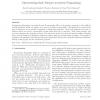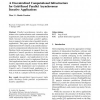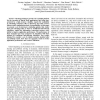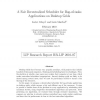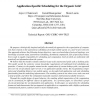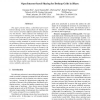145
click to vote
FGCS
2010
15 years 19 days ago
2010
Evolutionary Algorithms, including Genetic Programming (GP), are frequently employed to solve difficult real-life problems, which can require up to days or months of computation. ...
131
click to vote
GRID
2006
Springer
15 years 2 months ago
2006
Springer
Abstract Parallel asynchronous iterative algorithms relax synchronization and communication requirements, and can potentially extend Desktop Grids beyond embarrassingly parallel ap...
125
click to vote
GRID
2006
Springer
15 years 2 months ago
2006
Springer
Desktop Grids have proved to be a suitable platform for the execution of Bag-of-Tasks applications but, being characterized by a high resource volatility, require the availability ...
155
click to vote
HPDC
2010
IEEE
15 years 3 months ago
2010
IEEE
Voluntary Computing systems or Desktop Grids (DGs) enable sharing of commodity computing resources across the globe and have gained tremendous popularity among scientific research...
113
click to vote
CCGRID
2010
IEEE
15 years 3 months ago
2010
IEEE
Desktop Grids have become very popular nowadays, with projects that include hundred of thousands computers. Desktop grid scheduling faces two challenges. First, the platform is vo...
133
click to vote
EUROPAR
2009
Springer
15 years 5 months ago
2009
Springer
Whereas traditional Desktop Grids rely on centralized servers for data management, some recent progress has been made to enable distributed, large input data, using to peer-to-peer...
135
click to vote
CLUSTER
2004
IEEE
15 years 5 months ago
2004
IEEE
We propose a biologically inspired and fully-decentralized approach to the organization of computation that is based on the autonomous scheduling of strongly mobile agents on a pe...
114
click to vote
IPPS
2007
IEEE
15 years 8 months ago
2007
IEEE
This paper presents iShare, a distributed peer-to-peer Internet-sharing system, that facilitates the sharing of diverse resources located in different administrative domains over ...
107
click to vote
HPDC
2007
IEEE
15 years 8 months ago
2007
IEEE
In desktop grids the use of off-the-shelf shared components makes the use of dedicated resources economically nonviable and increases the complexity of design of efficient storag...
175
click to vote
ESCIENCE
2007
IEEE
15 years 8 months ago
2007
IEEE
In this paper, we present the design of Aneka, a .NET based service-oriented platform for desktop grid computing that provides: (i) a configurable service container hosting plugga...
